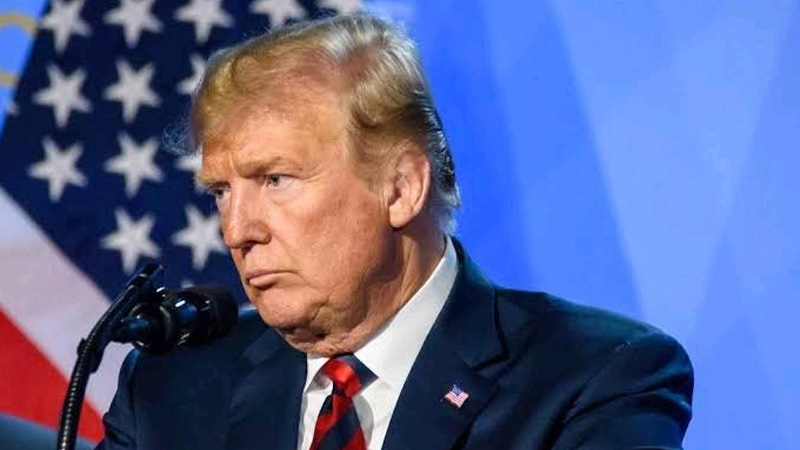Trump’s Bold Attack on War Report Faces Backlash as Key Military Leader’s Role Ignites Concern

[Image:Associated Press]
According to a report by Newsweek on Monday, August 26, 2024, former President Donald Trump’s recent criticism of a war readiness report has sparked controversy, particularly due to the involvement of General Jack Keane, a military leader Trump once praised highly.
The report, co-authored by Keane, warned about the United States’ preparedness for potential conflict with China, a topic that has become increasingly sensitive in current geopolitical discussions.
The report said: “The Commission finds that, in many ways, China is outpacing the United States and has largely negated the U.S. military advantage in the Western Pacific through two decades of focused military investment. Without significant change by the United States, the balance of power will continue to shift in China’s favor.”
Trump didn’t like this report. He called it “stupid” in his speech and wondered why it was released.
“We do a lot of reports that are stupid reports like a report that came out a couple of weeks ago that we would lose in a war with China. You saw that report? We’re not going to lose in a war with China,” Trump said.
He went on: “That we would lose in a war with China, how stupid are these people that they would put out a report like that? If you feel we’re a little weak, you’ve got to strengthen it up. But you don’t do a report that we’re going to lose to China.”
Trump’s dismissal of the report as “stupid” during a speech to the National Guard in Michigan has raised eyebrows across political and military circles.
The former president’s comments have drawn attention not only for their content but also for the apparent contradiction with his past praise of General Keane.
In March 2020, Trump awarded Keane the Presidential Medal of Freedom, lauding him as “a visionary, a brilliant strategist, and an American hero.”
This stark contrast between Trump’s past admiration and current criticism has led many to question the motivations behind his recent statements.
The report in question, released by the Commission on the National Defense Strategy, highlighted concerns about China’s military advancements and the potential shift in the balance of power in the Western Pacific.
It emphasized that without significant changes, the United States might find itself at a disadvantage in future conflicts with China.
Trump’s rejection of these findings has been met with mixed reactions, with some supporting his optimistic view of American military strength and others expressing concern over what they perceive as a dismissal of expert analysis.
The former president’s speech, delivered in Michigan, a key battleground state for the 2024 election, focused heavily on national security and foreign policy issues.
This emphasis is seen as a strategic move to differentiate himself from Vice President Kamala Harris, his potential opponent in the upcoming presidential race.
Trump’s approach to discussing military readiness and international relations has always been a defining aspect of his political persona.
His tendency to challenge conventional wisdom and official reports has been both praised and criticized throughout his political career.
The backlash to Trump’s comments has been swift, with many defense experts and political analysts expressing concern over the potential impact of dismissing such a crucial report.
Some argue that Trump’s statements could undermine public confidence in military preparedness assessments and hinder necessary improvements in defense capabilities.
General Keane, despite being the target of Trump’s criticism, has maintained a professional stance, refraining from direct comments on the former president’s remarks.
Keane’s reputation as a respected military strategist and his past role as an advisor to various political figures adds weight to the report’s findings.
The general’s warning about U.S. military readiness, particularly in comparison to China’s capabilities, aligns with concerns expressed by other defense experts and officials.
This alignment of expert opinions makes Trump’s dismissal of the report all the more controversial in the eyes of many observers.
The incident has reignited debates about the role of expert advice in shaping national security policies and the potential dangers of politicizing military assessments.
Critics argue that dismissing such reports based on political considerations could lead to dangerous oversights in national defense planning.
Supporters of Trump, however, view his comments as a demonstration of confidence in American military strength and a refusal to accept defeatist narratives.
They argue that public discussions of potential military weaknesses could embolden adversaries and undermine national morale.
The controversy comes at a time of heightened tensions between the United States and China, with ongoing disputes over trade, technology, and geopolitical influence.
Trump’s comments, therefore, are being scrutinized not only for their domestic political implications but also for their potential impact on international relations.
The incident has also sparked discussions about the broader issue of civil-military relations in the United States.
Some experts worry that publicly contradicting military assessments could strain the relationship between civilian leadership and military advisors.
Others argue that civilian oversight, including the ability to question military assessments, is a crucial aspect of American democracy.





